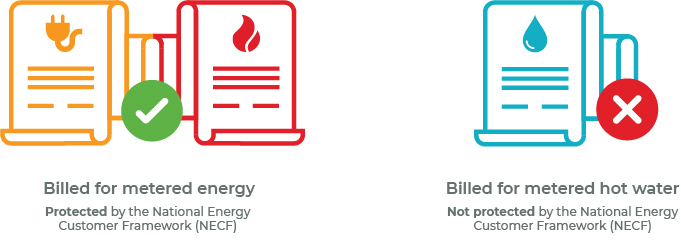-
Home
-
Publications and submissions
-
Reports
-
Spotlight On
- Hot water embedded networks
Hot water embedded networks

March 2021
The supply of hot water to NSW apartments should be simple, well-regulated and offer residents the same consumer protections as their gas and electricity supply. This isn’t the case.
The rise of emerging technologies, third-party embedded network operators and business models that effortlessly sidestep energy regulation has culminated in the supply, billing and maintenance of hot water, and common hot water systems, becoming increasingly complex.

More than 49,000 NSW residents are currently living in apartments where their hot water is supplied by a growing industry of embedded network operators and retailers. This has resulted in two distinct groups of hot water customers - those who are offered consumer protections, and those who fall outside of the safety net.
The 252,841 households charged for hot water usage as part of their retail gas bill, benefit from the energy specific consumer protections outlined in the National Energy Consumer Framework (NECF). But an increasing number of customers whose hot water is supplied by gas and hot water embedded networks have no consumer protection and no access to rebates or concessions
EWON received 2,633 complaints from residential gas customers in 2020. At least 56% of these complaints were from customers living in apartments or strata scheme complexes. Hot water services were a factor in around 29% of the gas complaints made by residential customers living in apartments, with many of these complaints relating to high and estimated bills.
Spotlight On shines a light on the importance of hot water as an essential service; its regulation in NSW, the need for residents to be covered by energy specific consumer protections, and most critically, why residents living in hot water embedded networks across Australia need access to Energy & Water Ombudsman schemes now and in the future.
Common hot water systems versus embedded networks
In many residential buildings across NSW, customers are supplied hot water through a common hot water system, rather than each apartment having its own water heater. Customers have an individual hot water meter maintained and read by the gas network provider, Jemena. This means that hot water charges appear on the customers retail gas bill, and therefore the customer benefits from energy specific consumer protections.
A hot water embedded network is an apartment building with a common hot water system where the hot water meters for each individual apartment are owned, maintained and read by a third-party, and not network providers. In this case, there is no relation to a customer's retail gas bill and the sale of hot water is not covered by energy specific protections.
There are differences in the way both models operate, and the protections offered to customers.
| Common hot water system | Hot water embedded network |
|---|---|
| Hot water meters owned and maintained by Jemena | Hot water meters owned and maintained by a third-party (embedded network provider) |
| Each hot water meter is registered on the gas retail market with a meter identification number | Hot water meters are off-market and not registered with the gas retail market |
| The customer is billed for the gas used to heat their hot water | The customer can be billed for gas megajoules (MJ) or for hot water (litres) |
| The customer has access to retail competition | The customer does not have access to retail competition |
| The customer is covered by all the consumer protections under NECF | The customer does not have access to the consumer protections contained in NECF |
| The customer has access to EWON | The customer may not have access to EWON |
Although both types of hot water systems operate differently, complaints to EWON hinge on the same consumer issues that emerge from other essential services, including gas and electricity:
- high bill disputes
- estimated bills
- customer service issues
- opening and closing accounts
- credit issues, including affordability.
EWON is faced with a situation where we receive similar customer complaints from customers within both systems, however only one customer group, those with common hot water systems maintained by Jemena, is afforded appropriate consumer protections.
Read case studies for examples of how we've helped customers.
The regulation dilemma
Hot water embedded network operators can choose which regulatory framework is most beneficial for the operator.
A hot water embedded network relies on two central inputs: energy and water. When the operator of a hot water embedded network on-sells energy and water as hot water, the existing regulations designed to protect energy and water customers no longer apply. This is because:
- The National Energy Retail Law (NERL) defines energy as: ‘electricity or gas or both’. This definition excludes hot water services from the consumer protections designed specifically for metered essential services in NECF.
- The regulations to the Water Industry Competition Act 2006 (WICA) exempts entities selling heated or chilled water to provide heating or cooling services from obtaining a WICA licence. The NSW Government does not require operators of hot water embedded networks to obtain a WICA licence.
This situation leaves it open to the hot water embedded network operator to choose the regulatory framework it wants to operate in. The operator does this by structuring the charges on the customer's bill. For example, if the operator does not want to attract energy regulations, it can choose to itemise the customer’s charges in cents ($) per litre of hot water (L) rather than cents ($) per megajoule of gas (MJ), or cents per ($) kilowatt hour of electricity (kWh). The choice of how to bill customers is therefore in the hands of operators whose focus may be profit maximisation rather than balancing business effectiveness with consumer protections / social licence.

Any customer billed in cents ($) per litre does not have guaranteed access to the consumer protections included in NECF, including EWON’s free, fair and independent advice and dispute resolution service. Access to EWON requires the hot water seller to be a member of EWON and while some EWON members operate in this market sector, other entities in this market sector are not required to be EWON members.
Consumer protections across the energy and water sector
| Consumer Protections | Metered gas and electricity supply | Metered water supply | Gas embedded networks* | |
|---|---|---|---|---|
|
|
National Energy Customer Framework (NECF) |
NSW legislation and regulations |
Unmetered gas or 'gas cooktop' supply |
Metered hot water supply |
| Pricing controls or access to retail competition |  |
 |
 |
 |
| Rights to access essential services and/or obligations on seller to supply |  |
 |
 |
 |
| Rebates & concessions (NSW only) |  |
 |
 |
 |
| Internal dispute resolution procedures |  |
 |
 |
 |
| Access to external dispute resolution |  |
 |
 |
 |
| Minimum contractual standards |  |
 |
 |
 |
| Billing, tariff and payment minimum requirements |  |
 |
 |
 |
| Protections for vulnerable customers |  |
 |
 |
 |
| Protections against disconnection |  |
 |
 |
 |
*EWON notes that hot water embedded networks can be powered by gas or electricity. We are focused on gas powered hot water embedded networks because the number of sites powered by electricity is limited. We are also unaware of any substantial growth in the number of hot water embedded networks powered by electricity. However, we consider that all hot water customers should benefit from increased consumer protections.
Metered hot water is an essential service
The NECF provides consumer protections guaranteeing electricity and gas customers access to an affordable energy supply, ensuring customer contracts are fair and reasonable, and includes provisions to keep households experiencing vulnerability connected.
The NECF recognises energy (electricity and gas) as an essential service. Energy is needed to heat water, an essential element of day to day life, which requires regulation and additional consumer protection. Over the last decade, new energy technologies and business models such as solar, battery storage and hot water embedded networks, mean energy is increasingly sold outside of the regulatory framework designed to protect consumers – it is essentially being eroded.
When the sale of hot water is separated from the sale of energy and water, and becomes unregulated, it places the security of one of our long-standing essential energy services at risk.
The Australian Energy Market Commission’s (AEMC) recent review of consumer protections in an evolving market looked at how NECF should evolve to respond to emerging energy technologies and business models. A report commissioned by the AEMC as part of this review defined an essential service as:
- the ability of consumers to connect to at least one (reliable) energy source
- protection from disconnection for consumers who rely on only one source of electricity
- the ability of those on life support equipment to access a reliable source of energy.
Access to hot water supply should be viewed through this lens.
What's at stake?
The AEMC's report identified five key areas of risk to consumer protections, relating to new energy products and services:
-
Risk one: consumers cannot access at least one reliable energy source for health, safety and wellbeing
-
Risk two: consumers cannot exercise choice or access retail competition
-
Risk three: consumers do not understand terms and conditions of unfamiliar products
-
Risk four: consumers experiencing vulnerability do not have appropriate protections
-
Risk five: consumers do not have access to accessible dispute resolution
Hot water is an essential service. Hot water customers deserve protection against these five risks and access to energy specific external dispute resolution schemes.
Change needs to be initiated
Complaints to EWON have put the spotlight on hot water embedded networks but we do not have the ability to address the regulatory imbalances without support. As the number of customers living within hot water embedded networks grows, regulatory change in NSW, and beyond its borders, is required.
We call upon government and policy makers to work with us to find a solution. EWON is positioned to convene a roundtable discussion and will reach out to policy makers to take a chair and initiate exploring solutions including:
- amending the National Energy Retail Laws to include hot water within the definition of energy which could enable the Australian Energy Regulator (AER) to apply the exemption to hot water embedded networks; and or
- calling on the NSW Government to require hot water embedded network operators to be regulated by WICA.
For queries about policy issues raised in Spotlight On, contact Rory Campbell. For media queries contact Fran Strachan.


 Consumers cannot access at least one reliable energy source for health, safety and wellbeing
Consumers cannot access at least one reliable energy source for health, safety and wellbeing